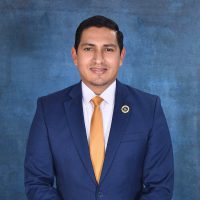
Ministerial Secretary
MISSION STATEMENT
The Ministerial Secretariat of the Association Central of Honduras of the Seventh-day Adventists, exists to serve the churches and ministerial families of this Association, in relation to the proclamation of the eternal gospel and in the divine mission of preparing us to meet the Lord Jesus who will soon come.
JOB DESCRIPTIONS
Why minister to ministers?
One of the most persistent themes for pastors and their families is:
“Once we have exhausted our energies ministering to others and need spiritual help or advice, who do we turn to?”
The Ministerial Secretary should be that source of help as a spiritual example and colleague to pastors, a mentor to students, an encourager to pastoral families, and a link to Association and Union leaders of pastors’ concerns.
The Ministerial Secretary does not represent the pastors against the Administration, but attempts to represent their needs in general to the administrators while promoting a harmonious working relationship between the pastor and the leaders of the Association.
The Ministerial Secretary’s task is more like a generalist rather than a specialist. You should know as much as possible about all aspects of the ministry.
The Ministerial Secretariat aims to meet these objectives through the ministry to:
- Pastors
- Pastor Families
- Elders of the churches
- Group Directors
- Deacons and deaconesses of the churches.
STATEMENT OF PURPOSE
I. TO THE PASTORS
To help pastors accomplish their task, the Association’s Ministerial Secretariat will serve them in the following areas:
1. SPIRITUAL GROWTH
Advise pastors and foster in them a deep and vigilant relationship with God. Training pastors to serve members in their greatest need; a revival of true godliness among us.
2. PROCLAMATION
Always keep pastors aware that their first calling is to proclaim the Word to the church and to the world, presenting Jesus as Savior and Lord of all peoples, regardless of race, gender, nationality, tribe, or economic status .
3. PERSONAL DEVELOPMENT
Encourage positive growth in the personal life of the pastor and his family. Recommend balanced use of time so that pastors gain comprehensive training while honing their talents and relationships.
4. PERSONAL GROWTH
Promote the professional development of pastors in the study and practice of the ministry, representing their interests before the Central Association and enhancing the image of the pastoral ministry with the aim of attracting and keeping qualified people in their ranks.
5. CHURCH GROWTH
Empower pastors to strengthen their congregations and embrace the priesthood of all believers, engaging all members in ministries so that churches are centers of loving care, dynamic evangelism, and the presence of the living God.
II. THE FAMILIES OF SHEPHERDS
The Central Conference Ministerial Secretariat, recognizes that in today’s complex world, ministry is not just in the interest of the pastor. The pastor’s wife and children are involved in and affected by the person and practice of the ministry.
For this reason, the Ministerial Secretariat supports the formation of a ministerial family and provides the necessary support and resources to wives who wish to serve as support in the ministerial team.
III. SUPPORT FOR THE PASTOR’S WIFE
The Central Conference Ministerial Secretariat is here to support pastors’ wives so that they can recognize and use their own spiritual gifts when serving in the local church.
It is the responsibility of the ministerial secretary to take the initiative and provide opportunities for pastors’ wives to come together to stimulate the role of becoming involved in SIEMA activities.
IV. THE CHILDREN OF THE SHEPHERDS
Pastors’ children have unique needs and gifts and deserve special care from the ministry of the church. The mission is to focus on the needs of pastors’ children hoping to guide them in their spiritual growth, providing them with resources and training.
The vision is to develop an effective ministry for the children of Central Conference pastors and to encourage in each pastor’s child the following:
- The love of God.
- A healthy self-awareness as a child of God.
- A growing spiritual relationship with Jesus and the Seventh-day Adventist Church.
- A renewed relationship with God and the church where estrangement has occurred.
- Greater participation in God’s mission for the church, the community and the world.
V. CHURCH ELDERS – TRAINING
The Ministerial Secretariat of the Central Association exists to lead the pastors of this Association in the training and training of the elders of their churches, so that they can help in the pastoral care of their congregations according to the indications of the Manual of the Church.
Specific areas in which the elder should be trained should include:
- Preaching
- Leadership in Worship
- Evangelism
- Education
- Visitation
- Church organization and administration
- Doctrinal orthodoxy
- Organizational loyalty and the ministry of the pastor-elder team.
The Ministerial Secretariat will hold a meeting every quarter of the year to teach and train pastors and elders to lead effectively in their churches, to accept delegated tasks and be available as lay leaders to promote and participate in missionary and evangelistic planning and materials from the offices of the Association to be implemented and developed in the churches.
VI. DEACONS AND DEACONESSES- TRAINING
The talent of service is a gift from God, without the participation of deacons and deaconesses it is impossible to imagine our working properly.
It is important to remember that the Central Conference Ministerial Secretariat in cooperation with other departments of the Conference exists to promote the training and equipping of the deacons and deaconesses of the churches. The pastor of the church has the responsibility for training in conjunction with the elders and others appointed by the pastor.
The work of deacons and deaconesses is multifaceted. Specific areas of training for these spiritual leaders of the church should include:
-
Teaching of the Word of God.
-
Visitation
-
General church activities such as the care and maintenance of church property
-
The cult
-
Sabbath School
-
The youth meetings
-
Prayer meetings
-
Communion Service
-
Baptism Ceremonies
-
Funeral
-
Weddings and other church gatherings.
